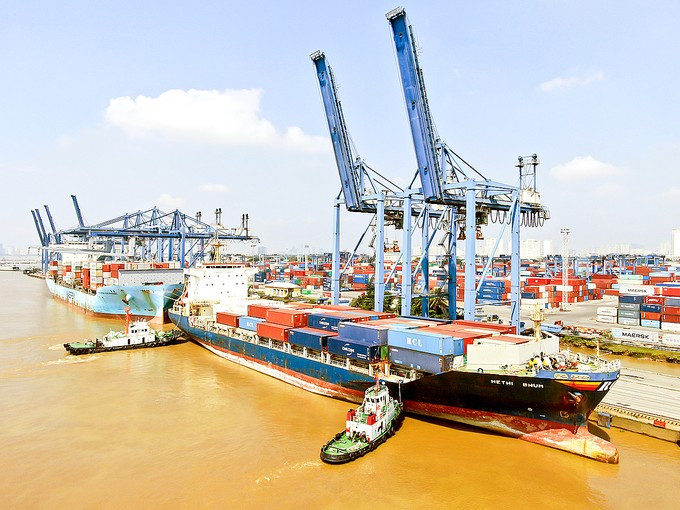
Head of the Vietnamese Trade Office in Saudi Arabia Tran Trong Kim shared that the conflict in the Middle East had in fact appeared before but it became more serious in the first quarter of 2024. Increasing attacks on cargo ships plying the Red Sea have posed a threat that could disrupt international trade.
As a result, freight companies have to reroute their routes through Africa's Cape of Good Hope instead of going through the Suez Canal. Currently, the number of ships passing through the Suez Canal has also decreased by 42 percent compared to 2023. According to Mr. Tran Trong Kim, currently, a number of large shipping corporations in the world stopped using Red Sea routes and the Suez Canal after vessels have been targets of attacks in the two routes.
For example, oil giant BP has paused all shipments of oil through the Red Sea after recent attacks and Taiwanese container shipping line Evergreen has decided to temporarily stop accepting Israeli cargo with immediate effect and instructed its container ships to suspend navigation through the Red Sea until further notice. Meanwhile, French container shipping giant CMA has also ordered all its fleets to leave the conflict area until further notice. Hapag-Lloyd, which controls about 7 percent of the global container fleet, has also paused all containership traffic through the Red Sea. This situation has added to shipping costs and caused delivery delays.
Head of the Department of European-American Markets Le Thi Thanh Minh added that maritime transportation costs have increased very high from the beginning of the year until now. Specifically, shipping costs to the US have increased from US$1,850 to $2,950 a container for West Coast seaports and soared from more than $2,000 to nearly $5,000 a container for East Coast seaports while shipping costs for the European market have reportedly hiked from $1,230 to $4,450 a container.
In addition, due to having to change the route to go through Africa's Cape of Good Hope instead of going through the Suez Canal, the shipping time is also extended by an average of 10-15 days. This makes the production plans of import-export enterprises in general passive and generates more surcharges from shipping lines.
Talking about the matter, Vice President Tran Nhu Tung of the Vietnam Textile and Apparel Association informed that export businesses are suffering from a double negative impact comprising increased freight rates and an increase in the value of the US dollar. Meanwhile, the textile industry must import up to 60 percent of production materials. Therefore, not only textile and garment enterprises but many businesses in other fields are considering receiving orders by prioritizing orders from nearby, easy-to-deliver markets such as Japan and China, Korea and temporarily refusing orders in distant markets such as the US, Europe, and the Middle East.
Chairman Nguyen Van Thu of the Board of Directors of G.C Food Joint Stock Company, revealed that currently, the company has temporarily suspended export orders to the Middle East market and shifted to favorable markets - China and Japan.
Mr. Truong Dinh Hoe, General Secretary of the Vietnam Association of Seafood Exporters and Producers, also said that seafood processing enterprises are also increasing exports to the Chinese market. At the same time, it is finding opportunities to export commodities to the Indian market. These are two potential markets with a population of nearly 3 billion people and very diverse consumer needs from medium to high-end segments. However, commercial counselors recommend that businesses need to be careful in trading while changing their markets.
Commercial counselors warned that some scammers claim to be from humanitarian and charity organizations that need to import large quantities of goods for relief and reconstruction purposes. Businesses are requested to be cautious and contact the embassy and Vietnam Trade Office in the region to find out information.
Vice Chairman Nguyen Phuoc Hung of the Ho Chi Minh City Union of Business Association (HUBA) said that businesses are still worried about the lack of orders. Generally, in the first four months of the year, businesses received more orders but some of them especially for some export enterprises depending on traditional markets such as Europe and the US didn’t receive many orders. For example, the rubber-plastic industry saw its about 20 percent decrease in overall revenue while essential goods decreased by about 10 percent and toys and construction goods decreased by nearly 30 percent. The retail and distribution industries are still facing widespread closures and bankruptcies. In addition, labor-intensive industries such as footwear and textiles still do not have medium and long-term orders, so production and business cannot be stabilized.
He proposed that as businesses are facing many difficulties, banks need to continue to reduce loan interest rates while considering increasing mortgage rates of assets and expanding lending based on contracts with future assets. Along with that, commercial banks should have a capital support policy combined with establishing preferential tax policies for businesses investing in digital transformation and green projects.
Such moves will contribute to creating favorable conditions for businesses operating in the online environment with the aim of nurturing the internal strength of businesses to maintain growth momentum after a long period of exhaustion due to economic crisis in the global, he added.
SGGP